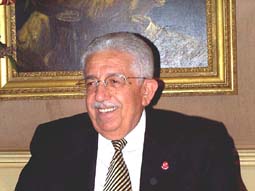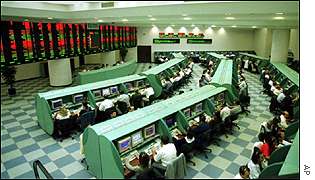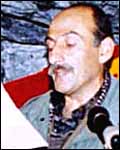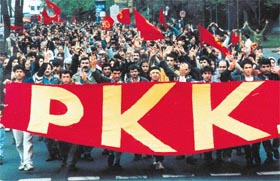20
June 2001
![]()
2. "TUSIAD expresses trust in Dervis as it rebukes government", congratulating the economy management for the successful debt swap, TUSIAD called on the government to take urgent steps for political reform and government restructuring.
3. "Israel, turkey, U.S. agree to launch missle cooperation", Israel, Turkey and the United States have for the first time reached an understanding on trilateral cooperation regarding missile defense.
4. "Turkey rejects Security Council resolution on UN peacekeepers in Cyprus", Turkey on Monday rejected as "unacceptable" a Security Council resolution extending the mandate of the UN peacekeeping force in Cyprus on the grounds that neither the Turkish Cypriots nor Ankara were consulted on the issue.
5. 'A solution is closer'", Kalkan said that the Kurds in Europe had opened the door for democracy and a solution much wider with their declaration of identity, adding, "The Kurds showed that European democracy has a long way to go."
6. 'I am Kurdish and I am PKK'", following France and Germany, Kurds living in Switzerland have also carried out a mass declaration of identity. Petitions entitled "I want my national and political rights" carrying the signatures of nearly 4,000 Kurds were presented to the Directorate of the United Nations Central Office.
1. -AFP -"Turkey's Islamist party makes last-ditch effort to escape ban":
ANKARA
Turkey's pro-Islamic Virtue Party appealed to the country's top
judges Wednesday not to make any imminent decision on whether to outlaw
the party. The party argued that parliament was preparing amendments
to the constitution that would make banning political parties more difficult.
The application, submitted to the constitutional court by Virtue MP Seref Malkoc, followed an agreement between all five parties in parliament last week on a series of amendements to Turkey's current constitution, drafted following a military coup in 1980, Anatolia news agency reported. The 37-item draft package, which can still be changed before reaching the general assembly for a final vote, includes a clause under which banning political parties would become more difficult with tightly outlined criteria to prove they had committed constitutional breaches. The Virtue application attracted support from Turkish Prime Minister Bulent Ecevit who said Wednesday that suspending any verdict on banning the party would be beneficial. "I think it would be good if there was a suspension. But the decision lies with the supreme court," Ecevit told reporters here. But the head of the constitutional court, Mustafa Bumin, did not offer Virtue any hope that its manoeuvre would bear fruit.
In remarks quoted by the all-news NTV channel, Bumin said the reasons Virtue cited in its request did not justify a suspension. "However, this is my personal view," he added. There are 10 other judges on the constitutional court panel, which is expected to issue its verdict by the weekend. In its request, Virtue argued the court should also wait for the outcome of a case at the European Court of Human Rights, which they said was to rule soon on whether Turkey had acted legitimately when it outlawed Virtue's predecessor, the Welfare Party, in 1998. The ban on Welfare was the climax of a harsh military-led anti-Islamist campaign that also forced Turkey's first Islamist Prime Minister Necmettin Erbakan, the Welfare leader, to resign.Virtue now risks the same fate.
The outcome of the case is of significance not only for the party itself but also for Ecevit's embattled government, since it could spark by-elections at a time when political stability is crucial to battle the country's severe economic crisis. "Turkey cannot afford elections now because we are implementing a programme to put the economy on track, which needs to be carried out with great sensitivity. If there were elections now it (the programme) would be torn to pieces," Ecevit said Wednesday. Turkey's public prosecutor accuses Virtue of being a "focal point" for anti-secular activities and an illegal continuation of the outlawed Welfare. Former chief prosecutor Vural Savas, who opened the case in May 1999, demanded Virtue's closure, a five-year political ban on its leadership and the removal from office of all 102 Virtue MPs. Savas described Virtue as a "blood-sucking vampire" for allegedly exploiting people's religious beliefs. The party is also charged with inciting protests against a headscarf ban in universities and orchestrating a failed bid by one of its MPs in 1999 to take an oath in parliament wearing a headscarf, a move seen as a symbolic challenge of Turkey's strictly secular order.
If the court removes at least 20 Virtue deputies, Turkey
will hold by-elections for the vacant seats in the 550-member house
and the government could come under pressure to conduct a general election.
But Turkey can avoid elections if the constitutional court heeds the
demand of the prosecutor who succeeded Savas. In a fresh indictement
in February, Sabih Kanadoglu maintained the call to outlaw Virtue, but
demanded the removal of only two MPs from office.![]()
2. - Turkish Daily News - "TUSIAD expresses trust in Dervis as it rebukes government":
Congratulating the economy management for the successful debt swap, TUSIAD called on the government to take urgent steps for political reform and government restructuring
GUZIN YILDIZCAN 
The Turkish Industrialists' and Businessmen's Association (TUSIAD),
the primary pressure group of big capital groups in Turkey, has once
more criticized the government, while it congratulated Economy Minister
Kemal Dervis for the swap operation. Speaking at the TUSIAD Higher Consultation
Board (YIK) meeting at Sabanci Center yesterday, TUSIAD YIK chairman
Muharrem Kayhan and TUSIAD chairman Tuncay Ozilhan criticized government
policy so far, and urged, "Unretractable steps that will trigger
changes in the frame of the current [economic] program."
Kayhan called the "Transformation to a Strong Economy" program the "biggest transformation program" in the history of the Turkish Republic, and said Turkey's integration to the developed West had been "under discussion for 20 years without being accomplished."
Kayhan said this project had four different "fronts," which were a) economic liberalization, meaning that the economy is governed by the rules of a liberal economy; b) political liberalization, suggesting acceleration of Turkey's democratization; c) restructuring of public administration, suggesting the establishment of an effective and productive central and local administration; and d) full membership to the European Union (EU), that is, Turkey's integration with the EU.
Uninterrupted reform
Comparing Turkey to a pyramid with four surfaces, Kayhan said it was impossible to treat these aspects separately or favor one, and urged that, "The pyramid be filled for uninterrupted access to the top." He said TUSIAD believed in the absolute need to complete the transformation process under debate in Turkey for 20 years, and said: "With this awareness, TUSIAD has been producing ideas which will hopefully be of use not only for the economy but also for politics, thus seeking to satisfy the conditions of this social project. The Constitutional amendment proposal on which parties have agreed is worthy of applause, but we would like to see the same performance in the political parties and electoral laws."
Problem of confidence as real sector suffers
Praising the efforts of Dervis, TUSIAD Chairman Tuncay Ozilhan called on politicians to take urgent action. Noting that the difference of the "Transition to a Strong Economy" program from similar projects in the past was its stress on political as well as economic transformation, Ozilhan noted the program had three legs, which are, a) recovery of financial system, b) restructuring of public administration; and c) "putting the real sector back on its feet."
Ozilhan said: "The government only focused on the first leg of the program. Steps to restructure public administration and get the real sector on track have not been planned yet. This is why the government is not too persuasive and has difficulty in instilling confidence."
Positive steps in financial sector thanks to Dervis
Recalling that important steps were taken to restructure the financial sector, and that the swap operation spreading short-term maturities of the Treasury had succeeded, Ozilhan said: "The internal debt of the state has been spread over a longer time through the successful operation of the economy management and unease declined. But it is too early to relax. The ease in the financial sector is partial. Work toward the financial sector has not yet been completed, since a large part of bank deposits are still short term. Decisions to lengthen maturity and strengthen the financial structure of banks should be taken. In addition, the importance of the real sector is not easily seen from this program. Ambiguity in this sphere should end."
Providing information about the steps that the government should take, Ozilhan asked for the restructuring of the public sector, a small state, acceleration of privation, which he said, "was almost forgotten."
Ozilhan recalled that, "The existence of the government
hinges on the success of this program, which in turn depends on slashing
public expenditures."![]()
3. - Middle East Newsline - "Israel, turkey, U.S. agree to launch missle cooperation":
TEL AVIV
Israel, Turkey and the United States have for the first time reached
an understanding on trilateral cooperation regarding missile defense.
Officials in all three countries said the understanding could lead to the first cooperative efforts during 2002. They said the cooperation would begin with the development of early-warning alert systems.
Under the proposal, Turkey would deploy an anti-missile defense system with U.S. and Israeli help. Officials said this could be the Arrow system or a hybrid with the U.S. PAC-3 and include joint production of components and subsystems.
"This is an issue to which we have made into a huge priority and we have been working on this for a long time," Israeli Defense Ministry director-general Amos Yaron said. "I believe that in the end, there will be a trilateral cooperation and production of systems. In the beginning, there will be early-warning alert. Later, there will be active systems."
Yaron said he hoped formal cooperation would begin in
2002. But he added that the United States would set the pace. ![]()
4. - AFP - "Turkey rejects Security Council resolution on UN peacekeepers in Cyprus":
ANKARA
Turkey on Monday rejected as "unacceptable" a Security
Council resolution extending the mandate of the UN peacekeeping force
in Cyprus on the grounds that neither the Turkish Cypriots nor Ankara
were consulted on the issue.
"This resolution will only serve to Greek Cypriots efforts to portray the Turkish Cypriots as non-existent and will add yet another obstacle for the resolution of the Cyprus problem," a foreign ministry statement said. The decision violated a long-established rule, under which UN peacekeepers could serve at trouble spot only with the concent of all interested parties, it added. The statement followed a similar reaction on Saturday by Rauf Denktash, the president of the breakaway Turkish Republic of Northern Cyprus (TRNC), where Turkey maintains some 35,000 troops. Denktash threatened to take "measures" in retaliation, but did not specify any possible moves.
Last Friday, the Security Council unanimously passed a resolution to extend the mandate of 1,216 peacekeeping troops, known as UNFICYP, until December 15, ignoring demands by the TRNC to be consulted. The UNFICYP was first sent to Cyprus in March 1964 following inter-communal riots in Nicosia, the eastern Mediterranean island's capital city. The force was expanded after 1974, when Turkey occupied the northern third of the island in response to an Athens-engineered coup in Nicosia seeking to unite Cyprus with Greece.
In December, Denktash refused to continue with UN-sponsored
talks on ending the island's division, which had then been going on
for 18 months, saying the negotiations went against the interests of
the TRNC, which was proclaimed in. ![]()
5. -Ozgur Politika - "'A solution is closer'":
Kalkan said that the Kurds in Europe had opened the door
for democracy and a solution much wider with their declaration of identity,
adding, "The Kurds showed that European democracy has a long way
to go."
PKK Council of Leaders member Duran Kalkan said that Europe was being
taught democracy with the "I am PKK, too" declaration of identity
campaign.
Appearing on the Gundem (Agenda) program the other evening on MEDYA TV, Kalkan said that the Kurds were carrying the problem closer towards solution with the declaration of identity campaign.
Kalkan sent his greetings to those who are participating in the campaign in a number of European countries, particularly Germany, adding, "It was once again shown where the solution will come from."
Kalkan called on those who had not yet declared their identity to join the campaign right away in order to achieve results, and continued to say the following: "It showed that the people have merged with the leadership and the party. It has finally reached the strength to create a solution, and it must be carried out with determination. Our leadership said that everyone should participate in any way he could and for those who could not do anything to keep their hearts clean with us. Therefore, now in this framework, let students in school say that they are Kurdish students. Let those in prisons give a defense saying they are PKK members. Let workers say that they are Kurdish workers. Everyone can do whatever is appropriate to the situation they are in."
Kalkan pointed out that the Kurds had exhibited that European democracy was opportunist and narrow and showed its divide-and-rule policy with their activities in question, adding, "The Kurds showed that European democracy has a long way to go."
Kalkan recalled that the PKK had been banned in Germany since 1993 and referred to his own situation in the famous Duesseldorf courts. "The government violated the law and made a political decision before the case had even finished," Kalkan said, adding, "They passed a separate law in order for such a verdict to be reached. Thus, law was used as a tool in a very open fashion."
'Let Europe not be obstinate'
Kalkan pointed out that the European system had created the divided situation in the Kurdish and Middle East geography, and continued to say the following: "If Europe wants peace, let it not be insistent on the system of a hundred years ago. They said Kurds have rights, too, from time to time. They encouraged the Kurds a little here and were an influence in the rebellions, but they also deceived the Kurds a bit. Depending on this, they tied the forces in the region to themselves more closely and made economic gains. The word Kurd does not even appear in the EU's Accession Partnership document. What kind of a document is this? It is a question of a people that comprises one-third of the population. Will [that people] not join also if Turkey joins the EU; if they will, as what will they join? Why don't you put a name to it? They are winking at Turkey, they are acting as if they support the Kurds. This is an imperialist policy."
'Non-serious and mocking'
Kalkan said that they found the package of constitutional changes presented recently to Turkish Parliamentary Speaker Omer Izgi to be "not serious" and "based on distracting attention. Kalkan continued to say the following: "There is no change here. They say that there can be publishing in forbidden and non-forbidden languages, there are prohibitory articles that are being lifted (!). As if they mean to say that what has been done up til now was tied to these prohibitions. There is a de facto situation. Isn't there an unbending denial out in the open; can a people's future be taken up in this way?"
Kalkan said that what was needed was not a patched-up
constitution but a constitution that was democratic both in its essence
and its form. He said, however, that the current government did not
have the political will to accomplish this and that the basic duty therefore
fell to patriots and democrats in Turkey, adding, "Otherwise, history
will not forgive them." ![]()
6. -Kurdish Observer -"'I am Kurdish and I am PKK'":
Following France and Germany, Kurds living in Switzerland have also carried out a mass declaration of identity. Petitions entitled "I want my national and political rights" carrying the signatures of nearly 4,000 Kurds were presented to the Directorate of the United Nations Central Office.
ALI OZSERIK 
The Europe-wide "I want my political and national rights"
campaign has taken off at the United Nations center in Switzerland.
About 500 Kurds from all the cantons of Switzerland met in front of
the UN center in Geneva the other day and presented the petitions saying
that "I am PKK, too" and carrying the signatures of 3,516
Kurds to UN Assistant Director Roland Besticker. The Kurds also said
"I am Kurdish and I am PKK" with the signs they were carrying
and the T-shirts that they wore.
Signatures and letters at the UN
The signed petitions were delivered by a four-person delegation including Kurdistan National Congress (KNK) Chairman Ismet Serif Vanli and member Ali Matur and other Kurdish representatives. Along with the petitions, they also presented letters to be delivered to UN Secretary General Kofi Annan and UN Commissioner for Human Rights Mary Robinson.
The letter noted that neither the Kurdish identity nor their political leadership had been recognized despite the drama that the Kurds had endured and the struggle they had carried out for years. It also pointed out that the Kurdish people had been sacrificed to the economic interests of the states under whose dominion they live and international politics, and stressed that they expected the UN to play the same role in the fate of the Kurds as it had for other people in the light of the UN's basic principles. Robinson is expected to officially meet with the Kurdish delegation in the days ahead.
3,516 signatures
The Kurdish delegation said that they had gather 3,516 signatures in just the past three days in their campaign and called for this to be taken into consideration also. The UN officials, for their part, listened to the delegation with great interest and accepted the petitions. The officials said that they were following developments in the struggle of the Kurdish people very closely and that they would forward the signatures and letters to UN Secretary General Kofi Annan and Human Rights Commissioner Robinson.
The women were enthusiastic
Kurdish women that gathered before the UN building drew attention with their determination and enthusiasm. The women said, "We cannot be true mothers as long as we do not leave an honorable and free country to our children," drawing attention with their national costumes and their enthusiastic slogans.
It was noted that the signature campaign would continue and broaden in the days ahead and that there would be demonstrations in front of the Swiss Parliament every Wednesday.
New declarations of identity coming up
Meanwhile, Kurds living in Sweden have completed the preparations for demonstrations they are planning to hold. The signature campaign and first sit-in demonstration being carried out by the Swedish Council of Kurdish Associations is to be held today (Tuesday). A member of the council Xalide Aziz, making a statement concerning the campaign which is to be carried out under the motto "Our identity is our honor," said that their aim was to achieve legal guarantees for their national identity. The signature campaign will begin with a sit-in demonstration in Stockholm's famous Sergestor Square and then will continue until September.
Kurdistanis will also hold sit-in demonstrations calling for their political identity to be accepted every day between June 19 and 29 at the hours from 14:30 to 18:00. The signature campaign and sit-in demonstrations will continue during the same hours every Monday as of June 29.
Kurdish women getting ready
Meanwhile, Kurdish women living in France have speeded
up their works for the "declaration of identity" campaign.
Kurdish women living in Marseilles will hold a demonstration today at
1:00 in front of the Marseilles Governor's Office the under the leadership
of the Free Women's Party (PJA). PJA administrator responsible for South
France, Arjin Garzan said, "Kurdistani women will show at the same
time their determination in their demands for peace with the declaration
of identity action. We are calling on all women to participate in this
action." The 500 women in Marseilles are expected to sign the declaration
of identity petition in Marseilles, while they will be treated to a
musical performance by Koma Rewsan. ![]()